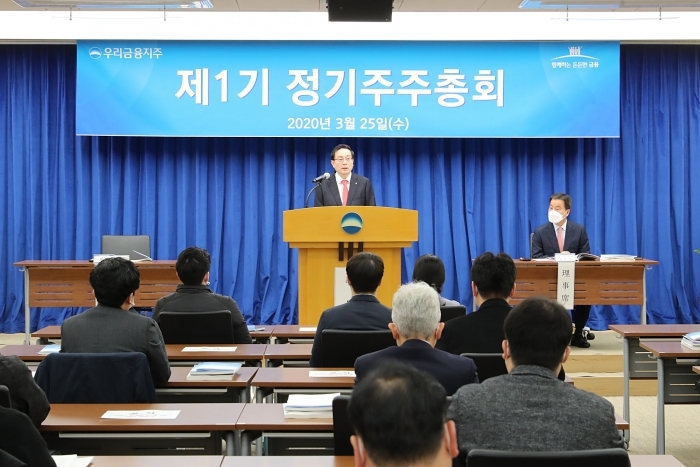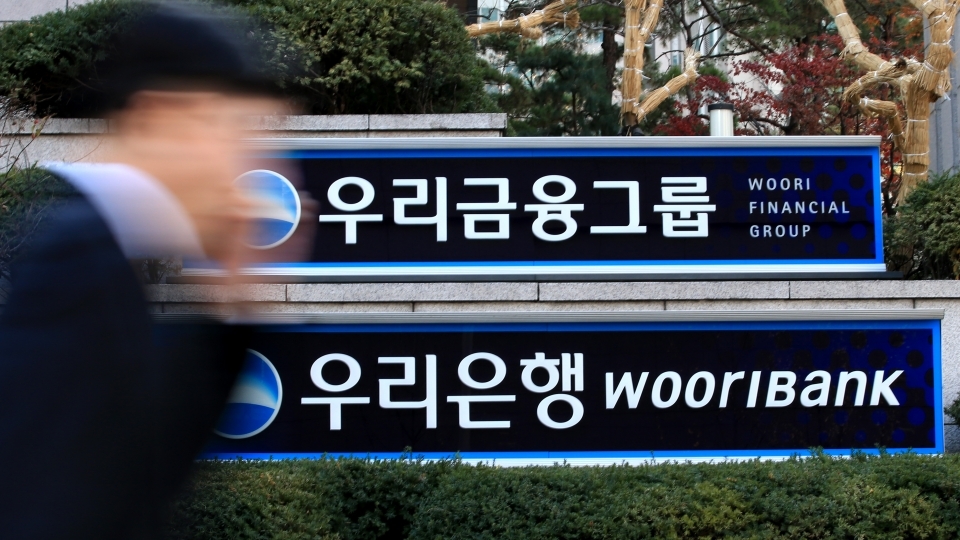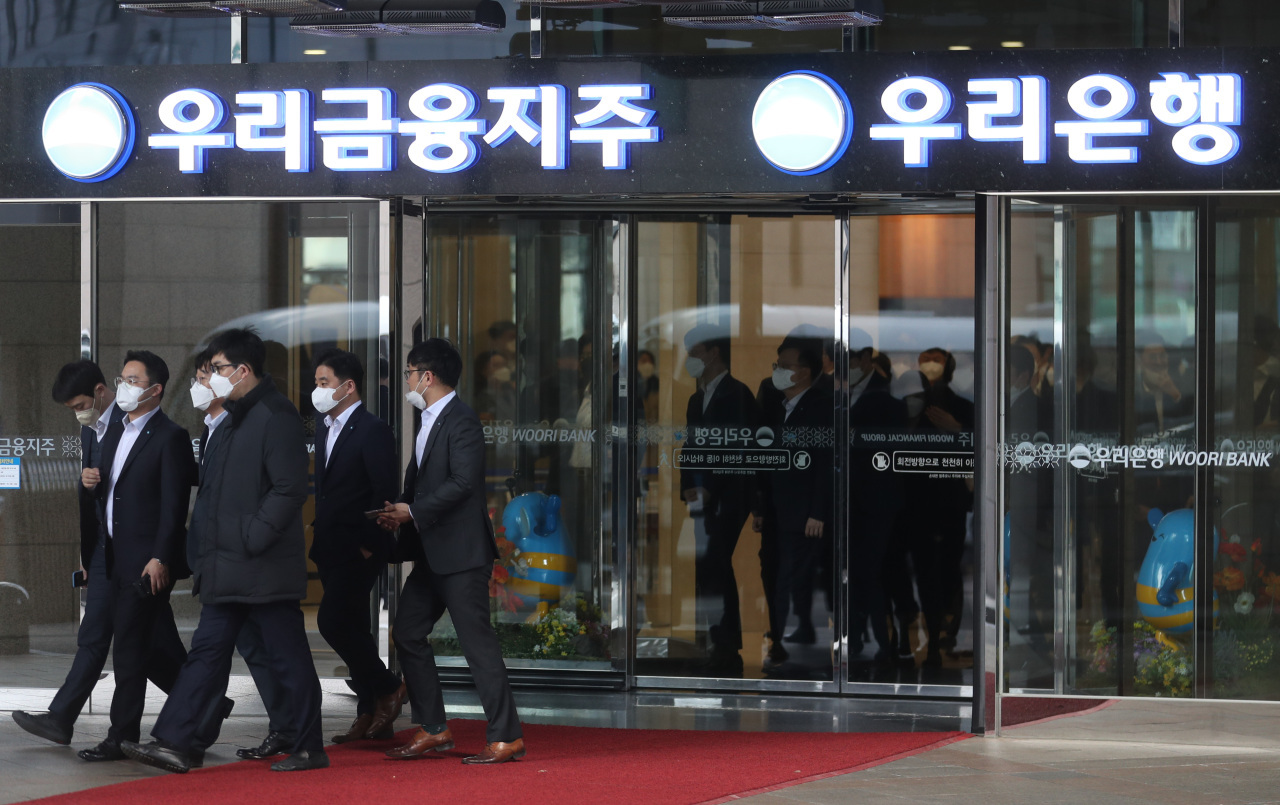[Decoding Shareholders] Woori Financial Group on long road to privatization
W12.7tr government bailout saved lender in 1998, but led to questions about bank’s identity as private institution
By Jung Min-kyungPublished : Sept. 22, 2020 - 15:16

This is a part of a series exploring the governance structure of financial giants in South Korea and examining diversity and transparency in boardrooms. -- Ed.
It was a 12.7 trillion won ($10.6 billion) government bailout that saved Woori Financial Group, then known as Hanvit Bank, in 1998 when it was reeling from the 1997 Asian financial crisis. For more than 20 years, the lender survived and kept its status as one of South Korea’s financial giants. But the remaining presence of state funds in its governance structure, meaning its incomplete privatization, is limiting its attempts at business expansion, experts say.
The government’s decision to “invest” taxpayers’ money in 1998 raised concerns, but the bailout went ahead and the funds were eventually funneled into the group in stages until 2006. In the process, the state-run Korea Deposit Insurance Corp. acquired a 100 percent stake in the banking group, which was officially reborn and launched as a holding company in 2001.
From then on, the group rose rapidly to its current fame as one of the largest banking groups in Asia’s fourth-largest economy.
But the group’s success story of getting back on track was a prelude to Woori’s long road back to private ownership.
Once Woori’s business normalized, the government sought to recoup its initial investment and use taxpayers’ money on other projects. Woori’s identity crisis also needed to be resolved -- the banking group had a big appetite for business and faced too many restrictions as a state-run institution.
From 2010 to 2012 the government attempted to sell its stake in Woori, all at once, on three occasions, but there wasn’t a firm or a consortium willing to stomach the whole pie.
It was a roller-coaster ride for Woori for the next few years, with industry rivals NongHyup Financial Group and JB Financial Group acquiring some of its units on one occasion and Kyobo Life Insurance pulling out of a major bid on another. The government sold off the KDIC’s stake in Woori piece by piece, retaining a 51 percent stake in the group until 2016.
Then, in mid-2016, the group saw a silver lining as the KDIC signed a 2.4 trillion won deal with seven institutional investors to sell a 29.7 percent stake in the group.
As of the first half of this year, the KDIC was still Woori’s largest shareholder with a 17.25 percent stake.
Other noteworthy shareholders include the National Pension Service with an 8.37 percent stake and Woori’s own employees with a 6.39 percent stake. IMM Private Equity, a leading local private equity, holds a 5.98 percent stake, while 9 percent of the group is owned by various local financial institutions.
It was a 12.7 trillion won ($10.6 billion) government bailout that saved Woori Financial Group, then known as Hanvit Bank, in 1998 when it was reeling from the 1997 Asian financial crisis. For more than 20 years, the lender survived and kept its status as one of South Korea’s financial giants. But the remaining presence of state funds in its governance structure, meaning its incomplete privatization, is limiting its attempts at business expansion, experts say.
The government’s decision to “invest” taxpayers’ money in 1998 raised concerns, but the bailout went ahead and the funds were eventually funneled into the group in stages until 2006. In the process, the state-run Korea Deposit Insurance Corp. acquired a 100 percent stake in the banking group, which was officially reborn and launched as a holding company in 2001.
From then on, the group rose rapidly to its current fame as one of the largest banking groups in Asia’s fourth-largest economy.
But the group’s success story of getting back on track was a prelude to Woori’s long road back to private ownership.
Once Woori’s business normalized, the government sought to recoup its initial investment and use taxpayers’ money on other projects. Woori’s identity crisis also needed to be resolved -- the banking group had a big appetite for business and faced too many restrictions as a state-run institution.
From 2010 to 2012 the government attempted to sell its stake in Woori, all at once, on three occasions, but there wasn’t a firm or a consortium willing to stomach the whole pie.
It was a roller-coaster ride for Woori for the next few years, with industry rivals NongHyup Financial Group and JB Financial Group acquiring some of its units on one occasion and Kyobo Life Insurance pulling out of a major bid on another. The government sold off the KDIC’s stake in Woori piece by piece, retaining a 51 percent stake in the group until 2016.
Then, in mid-2016, the group saw a silver lining as the KDIC signed a 2.4 trillion won deal with seven institutional investors to sell a 29.7 percent stake in the group.
As of the first half of this year, the KDIC was still Woori’s largest shareholder with a 17.25 percent stake.
Other noteworthy shareholders include the National Pension Service with an 8.37 percent stake and Woori’s own employees with a 6.39 percent stake. IMM Private Equity, a leading local private equity, holds a 5.98 percent stake, while 9 percent of the group is owned by various local financial institutions.

Woori is slated to become fully privatized by 2022, with the government planning to sell the KDIC’s remaining stake soon. The government has so far retrieved around 11.1 trillion won of what it put into the bank nearly two decades ago.
While the KDIC’s stake has been significantly reduced, it continues to remain at the center of debate on whether the state-run institution should intervene at the firm’s shareholders meetings.
When incumbent Woori Financial Group Chairman Sohn Tae-seung needed the shareholders’ votes in March this year to begin his third term as the firm’s chief, some onlookers were curious about the KDIC’s next move.
The government had vowed in 2016 not to participate in Woori’s executive selection process, but in March 2020 the nation’s watchdog Financial Supervisory Service reprimanded Sohn and fined Woori Bank over the misselling of so-called derivatives-linked fund products. The funds -- sold by several other lenders and brokerages and tied to the bond yields of major economies -- led to investors losing most of their principal investments as interest rates unexpectedly sank.
Sohn ultimately received an up vote from the KDIC, earning another three years as the banking group’s chief. The KDIC was reportedly cautious about expressing its stance.
“The KDIC should have sold all of its stake in Woori sooner,” Lee In-ho, an economics professor at Seoul National University, told The Korea Herald on Monday.
“Woori is not a ‘state-run bank,’ and it is just not in accordance with the market -- the government could make a completely tone deaf decision regardless of Woori’s nature,” he added.
More hurdles
At the same time, however, experts stressed caution as the government’s presence in the banking group could be replaced with those of foreign private equity firms, which focus on maximizing their own investments.

But the government’s goal of selling its remaining 17.25 percent stake is likely to be pushed back further due to its stocks having been hit by coronavirus woes.
Woori Financial Group’s shares have nearly halved in value since the beginning of the year. It was trading at some 8,100 won on Friday compared with some 12,000 won in January.
“There was news of the KDIC tapping investors for the stakes, but there is little chance that privatization will materialize anytime soon,” said Choi Jung-wook, an analyst at Hana Financial Investment.
“But there is also a chance that issues surrounding Woori’s Aju Capital acquisition will work as a short-term momentum for its share price.”
By Jung Min-kyung (mkjung@heraldcorp.com)






![[From the Scene] Monks, Buddhists hail return of remains of Buddhas](http://res.heraldm.com/phpwas/restmb_idxmake.php?idx=644&simg=/content/image/2024/04/19/20240419050617_0.jpg&u=20240419175937)





![[Graphic News] French bulldog most popular breed in US, Maltese most popular in Korea](http://res.heraldm.com/phpwas/restmb_idxmake.php?idx=644&simg=/content/image/2024/04/18/20240418050864_0.gif&u=)



![[From the Scene] Monks, Buddhists hail return of remains of Buddhas](http://res.heraldm.com/phpwas/restmb_idxmake.php?idx=652&simg=/content/image/2024/04/19/20240419050617_0.jpg&u=20240419175937)

![[KH Explains] Hyundai's full hybrid edge to pay off amid slow transition to pure EVs](http://res.heraldm.com/phpwas/restmb_idxmake.php?idx=652&simg=/content/image/2024/04/18/20240418050645_0.jpg&u=20240419100350)

![[Today’s K-pop] Illit drops debut single remix](http://res.heraldm.com/phpwas/restmb_idxmake.php?idx=642&simg=/content/image/2024/04/19/20240419050612_0.jpg&u=)